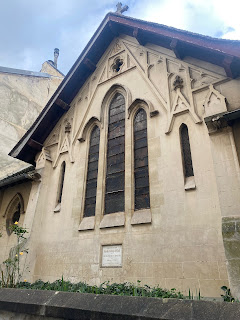Divine Purposes
 |
| The Church of the Nazarene in Versailles. |
Scripture:
Rom. 9:14 What then are we to say? Is there injustice on God’s part? By no means! 15 For he says to Moses,
“I will have mercy on whom I have mercy,
and I will have compassion on whom I have compassion.”
16 So it depends not on human will or exertion, but on God who shows mercy. 17 For the scripture says to Pharaoh, “I have raised you up for the very purpose of showing my power in you, so that my name may be proclaimed in all the earth.” 18 So then he has mercy on whomever he chooses, and he hardens the heart of whomever he chooses.
Observation:
For those of us in the Wesleyan/Arminian world, this passage can be a bit of a challenge, but it is not the only place where Paul talks about these kinds of divine purposes. He will go on in other passages to talk about the free will of humanity. Overall, we can wrap our arms around the fact that Paul wants us to understand that “God has determined to treat humans on the basis of mercy; otherwise none would be saved” (Greathouse & Lyons, NBBC).
Overall, we must come to understand that God is just! However, God is not only just, but also merciful, and full of compassion. We must be careful not to judge and/or determine on whom God will show compassion. That is not for us to determine, but it is to be left to God. Wesley puts it this way, “I will have compassion on whom I will have compassion—Namely, on those only who submit to my terms, who accept of it in the way that I have appointed. God has an indisputable right to reject those who will not accept the blessings on his own terms. So then—That is, accordingly he does show mercy on his own terms, namely, on them that believe. And whom he willeth—Namely, them that believe not. He hardeneth—Leaves to the hardness of their hearts” (Wesley, Notes).
Finally, we are brought to the example of Pharaoh, “Pharaoh exists not to further his political or personal ends, but God’s. And God’s ends are theological—to carry out a mighty act of salvation in order that this might be publicized throughout the world. On the stage of world history, Pharaoh provided the occasion for God’s deliverance of his people Israel; if there were no Pharaoh, there would be no people of God” (Greathouse & Lyons, NBBC).
Application:
As a little girl I used to ponder some of these questions about God. Especially, I wondered about Judas Iscariot, who betrayed Jesus. It bothered me to think that God had made Judas do what he did — and then punished him for it, if Judas had no choice in the matter. Then, one day as I was flying in a plane, I had a bit of an epiphany. From up in the air, I could see the roads below. It meant that I can see if two semi trucks were both on the same side of the road, but each going in a different direction. I could see that there would be a head-on collision because of having a birds-eye view of the situation — but just because I could see what was going to happen, it didn’t mean that I would have caused it to happen.
This led me to an understanding that God has a birds-eye view of what is happening in the world. He could see that Judas was heading down a pathway of self-destruction, a path of his own making, but God could also see where it was leading. Just like Pharaoh, the result of the continual rejection of God was a hardened heart. Therefore, God’s divine purposes were accomplished. I also have to believe that had Judas responded to God’s mercy and grace, someone else who had hardened their heart, would have taken his place. God didn’t make it happen — but he saw it coming.
Ultimately, what we also learn from this scripture is that God does have divine purposes in mind in the activities of history. God knew that Pharaoh had a hard heart and so God used him to establish the Israelites. God used him for divine purposes to reveal his power and authority over his people. God was ultimately glorified.
As we look at the world around us, we may wonder whether there are divine purposes at work. Just as the news tells us that a volcano is rumbling beneath Iceland, so there is a geo-political volcano that seems to be smoldering, and possibly waiting for a larger eruption. We may be tempted to ask where God is in the midst of all of this, and yet, God is watching, and God has divine purposes. Those purposes may be difficult for us to grasp, but we are to trust God. At the same time, we are never to allow our hearts to be hardened. God is constantly reaching out to us in divine mercy and compassion, and we have the choice to respond, but we are not to judge God’s compassion. We may be oddly surprised at those on whom God showers his mercy — but that is not up to us. His divine purposes must allow us to rest in the belief that God has all of this. He sees it and knows what is happening — while at the same time being engaged as a loving and just Heavenly Father.
Prayer:
Lord, may I trust in you today, in the seen and the unseen. There is always more at work than we can comprehend. Forgive us for when we try to explain the mystery of your ways with inadequate words, or when we try to “fix” things on our own. Amen.
Comments
Post a Comment